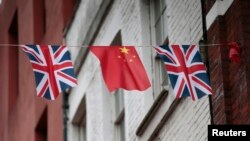China says it has detained an individual accused of collecting state secrets on behalf of Britain's foreign intelligence agency MI6.
The Ministry of State Security posted on social media Monday that Britain had been cooperating since 2015 with the person, who it said was a citizen of a third nation and had the surname Huang.
The ministry said Huang had received training in intelligence gathering, was provided with equipment and had collected numerous state secrets on repeated visits to China. No further information on the intelligence gathered was given, nor did the ministry say when he or she had been detained or where they were being held.
The definition of state secrets is not clearly defined under China's opaque political and legal system, and many consulting and advisory firms have been investigated for obtaining data that would ordinarily be in the public record, particularly if they were shared with foreign entities.
The British government declined to comment, in keeping with its longstanding policy on intelligence matters.
China's allegations follow a deterioration of relations between the sides sparked in part by British opposition to Chinese investments in the country, especially in the power and communications industries where the ruling Communist Party exercises strong influence.
In September, British police said two men were arrested earlier last year on suspicion of spying for Beijing. Police did not name the men, but British media reported that the younger man was a parliamentary researcher who worked with senior Conservative Party lawmakers focused on China. The U.K. condemned the interference in British parliamentary democracy, but China denied the spying allegations.
London has also been highly critical of China's curtailment of political rights in Hong Kong, a former British colony where violent anti-government protests in 2019 were met with Beijing's imposition of a sweeping national security law and electoral changes. Those have largely eliminated any political opposition to Beijing's decrees and silenced freedom of speech in what had been one of Asia's most dynamic societies and a major financial center.




